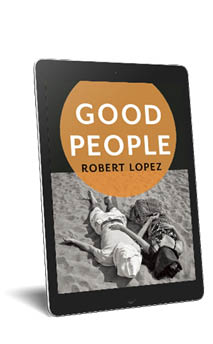READ AN EXCERPT

We are in a boat but there’s no captain, no crew of any kind. I do know bow and stern and starboard and port and I know the hull and that the captain always goes down with his ship, but you have to know navigation to be a captain and I don’t know navigation. I couldn’t navigate a toy boat from one side of a bathtub to another. I have no sense of direction, other than everything is always going to hell. You don’t have to study navigation at the naval academy or own a compass to know this much about the world, to know where everything is always going.
I’ve never owned a compass myself, but my father did once. He never let me touch it, said I wasn’t responsible enough. I lost his pocket watch is why he said this about me, why he never let me touch the compass. He said he hated my guts because I lost his pocket watch and that I’d rue the day. I never did rue any of the days, but I always regretted losing my father’s pocket watch, which turned out was given him by his grandfather who fought in the Great War. He said that his grandfather held on to that watch through many a hard-fought battle and it was good luck and a family heirloom. He said that watch survived the Germans and mustard gas but couldn’t last five minutes in my feckless hands. I didn’t know what feckless meant back then and I still don’t think I know what it means, but I used to look at my hands to try and figure it out. My hands are small and smooth and offer no clues. My father said I was delicate, called me a daisy. I don’t think my father ever had anything good to say about me, at least not after the pocket watch. I’m not sure how I lost that pocket watch, but I’ve always suspected my brother stole it. My brother was no good and a common criminal but even still he always outsmarted me. I think my brother is in prison now, which probably serves him right.
I heard from some relative that he tried robbing a liquor store but it didn’t work out, that his accomplice gave him up during questioning. It seems right to me because our father gave up on both of us long ago and my brother and I gave up on each other shortly after that. Our father always wanted the two of us to enlist, but neither of us ever did. This is another thing I regret. I think I would’ve done well in the service. I’d probably have joined the army because I don’t much care for water. This is another reason I’m no captain. I’m probably not qualified to be a crew member, either. I don’t know what the crew is responsible for on a boat, but one assumes it’s the grunt work. Toting barges, lifting bales, things of this nature. I’ve never been good at anything physical. I can’t even mop a floor properly. I always leave swaths of floor streaked and unmopped. Our father used to admonish me for mopping the floor this way. It was the same whenever I mowed the lawn, which was only that one time. My father came outside and said, this is what you get when you ask a daisy to mow a lawn. He was referring to certain lanes where the grass was still knee-high. This is why I’d do better as a field general behind the front lines or in front of them, drawing up battle plans on a blackboard, barking orders to subordinates.
I suppose field generals are out there in the field, though, inside tanks, looking through periscopes, but I don’t know if they have periscopes in tanks. Surely there are periscopes in submarines, but probably not tanks. I have no idea how they see from inside a tank. I don’t know how they can steer from inside a tank or how they know where to aim the cannon. I don’t even know if that’s what they call the guns that sit atop tanks. To me, it looks like a cannon, but I’ve never seen a cannon in real life so I don’t know what one actually looks like. Another thing I don’t know is if they had tanks during the Great War or if my father’s grandfather ever rode in one. The only thing my father told us about his grandfather was that he fought in the Great War and had a lucky pocket watch. My brother said that our father made up these stories about his grandfather, that he never did fight in any war, let alone a great one.
Excerpt from Good People. Copyright © 2015 by Robert Lopez. Published by Bellevue Literary Press: www.blpress.org. Reprinted by permission of the publisher. All rights reserved.
About The Book
In these twenty stories, a motley cast of obsessive, self-deluded outsiders narrate their darker moments, which include kidnapping, voyeurism, and psychic masochism. As their struggles give way to the black humor of life’s unreason, the bleak merges with the oddly poetic, in a style as lean and resolute as Carver or Hemingway. Treading the fine line between confession and self-justification, the absurd violence of threatened masculinity, and the perverse joy of neurosis, Lopez’s stories reveal the compulsive suffering at the precarious core of our universal humanity.

Continue Reading…
Article originally Published in the February/March 2020 Issue “Short Stories”
